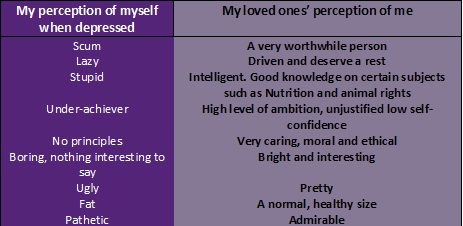When we are busy, understandably, we don't always have the time to question the thoughts we have. Consequently we can end up accepting irrational thoughts (grandiose or negative) and having an incorrect perception of ourselves that hinders our well-being.
I've mentioned that when I had quite a bad depressive episode I had an extremely low opinion of myself and really didn't feel like I knew who I was. See: http://samanthathesanevegan.blogspot.co.uk/2015/08/im-not-sane-but-sanity-is-over-rated.html
I can remember looking on my facebook profile through all my 'likes' in an attempt to try and remind myself of who I was. I was thinking 'I don't like or care about any of these things, I have become such a horrible person!' (I've realised that of course this is not true, it's just a sign I'm exhausted and need a rest.) I decided to ask my siblings how they would describe me to someone else and this really helped me.
This is an accurate description of the discrepancy between mine and my siblings' perception of me at the time:
My goodness, I really am paranoia aren't I! How depressing! I realise I'm extremely fortunate to have a good relationship with my siblings and be in touch with them. If you are surrounded by people who are more like 'paranoia' try to find a way to change this. If you can't afford to move house or away from the situation, try to find like-minded people through forums or meet-ups. And if the person that is making you feel awful about yourself is you, change your thoughts! See http://samanthathesanevegan.blogspot.co.uk/2016/05/winning-battle-of-mind.html for more on this.
The problem with always listening to 'Confidence'
In the Red Dwarf episode 'Confidence' tells Lister that he is brilliant at the guitar when clearly he is useless. He also takes him outside of the spaceship and says that it's okay for Lister to take off his protective oxygen helmet in outer space. To demonstrate this he takes his own oxygen helmet off and then ends up exploding.
Whilst this is not a situation most of us are going to encounter in life, it's an example of how being too confident can be dangerous.
 |
| try to hover around the middle! |
When coming out of a depressive episode or a difficult time, one can start to feel a lot more confident which of course is a positive.
The trouble is, being too confident or having unrealistic ambitions can lead you into disappointment and this was definitely a problem for me. For years I didn't know what I wanted to do with my life and so when I decided to train as a Nutritional Therapist I was filled with excitement and had a flood of ideas. I always knew it wouldn't be easy but I vastly underestimated how hard it was going to be. I did manage to get through it but it quite literally drove me insane with stress and the pressure to start up a practice after graduating sunk me into quite a serious depression.

It's so important to strike a balance between being too doubtful or too confident. Positive Psychology (my favourite subject on my first degree!) books are really good for this, it's not about forcing yourself to feel positive all the time as some people wrongly assume. I've not tried mindfulness yet but it works for a lot of people.
Right now I think I'm definitely in the process of becoming more grounded.
I don't think I'm the most gorgeous, intelligent, competent, exciting person in the world but I don't need to be in order to feel good about myself. We all have some good qualities (even if they might not be clear to us) and deserve to feel positive about ourselves.
Don't listen too much to confidence or paranoia, listen to the voice of reason!



Great article and analogy. This reminds me of something I was discussing with my CPN. As we develop, we learn to weigh situations up logically to determine the best course of action, but in situations we perceive to be dangerous and no logical solution is immediately found, the fight or flight response kicks in.
ReplyDeletePeople who suffer from panic attacks have an abnormally low threshold above which this response is triggered.
The Paranoia character does serve a purpose. He's supposed to be there to make determinations about our limitations, a vital component of assessing how dangerous a situation is. When a person has low self-esteem, he works overtime and sees failure all around him. This, in turn, feeds into our perception of danger, causing anxiety and panic over situations that aren't truly dangerous.
For example, a person who has low self-esteem may see themselves as inferior to others. That perceievd inferiority causes them to fear social interaction. This fear of social interaction can be so high that it triggers the fight or flight response. Therefore, this person has panic attacks when faced with social situations.
thank you, yes I understand what you're saying and glad somebody identifies with my points
ReplyDelete